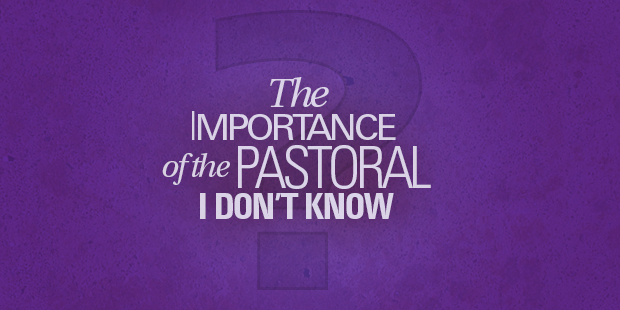
The Importance of the Pastoral “I Don’t Know”
“My happy conviction is that pastors ought not to be experts on everything.”
– John Piper
One of the most valuable sentences in a pastor’s arsenal is “I don’t know.” The pressure to know and be everything everybody expects us to know and be can be pride-puffing. I once worked at a bookstore where we were told never to say “I don’t know” to a customer. We must give them some answer, any answer, even if it was a guess or a likely wrong answer. Customers don’t want to hear “I don’t know” from service people, but even a wrong answer makes them feel helped. I confess the temptation to “satisfy the customer” has persisted through my ministry days, for a variety of reasons. I want people to feel helped. And I also don’t like looking like a rube.
Why is it important for pastors (and Christians in general!) to say “I don’t know” when they don’t know?
1. Because it’s the truth.
First and foremost, if you don’t know the answer to something, say you don’t know the answer. Making up stuff up is not our calling. We all know some folks who seem pathologically unable to admit ignorance in any area. I don’t trust those people, and neither should you. Better a disappointing truth than a manipulative or misleading fabrication.
2. Because it impresses the right people.
I’ve done more than a few Q&A’s after preaching or on panels at speaking engagements before, and the desire to impress with wisdom and insight can be nerve-wracking. Once during a Q&A after a sermon at our church in Nashville, I got real honest when a question stumped me. I don’t remember what it was, but I remember realizing I had no information available to my brain to even begin formulating a halfway intelligent response. So I just said, “I’m sorry, but I don’t know the answer to that.” Afterwards a young lady approached me to thank me for saying “I don’t know.” She said she wished more “religious people” could say it too. The reality is that acting like you know everything impresses shallow, naive, or otherwise easily impressed people. But saying “I don’t know” impresses people who value honesty and appreciate their pastor admitting weakness, ignorance, or just general fallibility.
3. Because it trains others not to be know-it-alls.
A few weeks ago a fellow came up to me after our service to ask about the Old Testament figure Ahimelech. I recognized the name but could not recall his biblical importance or the narrative where he was found. My inquirer expected that, as a pastor, I would know all about this figure and even the references where he would be found. I blanked. When I looked him up later, of course, I “remembered” who Ahimelech was, but in the moment, despite losing face with a relatively new Christian, I said, “Brother, I don’t remember. I just don’t know.” This led to a great talk about so-called “Bible trivia,” knowledge, learning, wisdom, and righteousness and the like. I think it was a teachable moment for both of us, but I walked away believing that when a leader is open about the gaps in his knowledge it trains others to be okay with not knowing everything. Of course, we want to know our Bibles as well as we possibly can, but we want to remember that knowledge puffs up and that the Scriptures and the doctrines they teach are meant to make us full-hearted with Christ not big-headed with minutiae.
4. Because it cultivates humility.
It is good for a pastor’s heart — no matter the reception — to make his “I don’t know”‘s public.
Read more from Jared here.

Tags: Clarity, Humility, Leadership Engine











